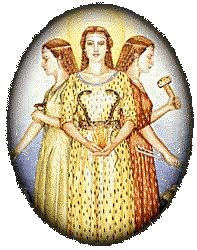“At least we can assume there must have been an empty tomb involved as they all agree on that point.”
No we do not have to agree that there was even a crucifixion whatsoever-let alone some empty tomb. Again, making stuff up doesn’t count as responsible historiography.
Ruskin wrote,
“There must have also been some kind of "experience" of Jesus after his death as well much as say Saint Paul had on the road to Damascus. It should be noted that Paul was hostile to Christianity at the time.”
Again, no we don’t have to assume these things! Do you accept the miracle stories of other religions merely because some of their adherents profess to have had some kind of mystical experience about their religion? Of course not! You have no problem rejecting such claims, and, yes, I can provide such supposed proof of these religious claims that are at least as equal in standing to your own.
Also, Paul’s so-called hostility to Christianity is ONLY so according to him and those that followed him (the writer(s) of Acts). So, once more, you’re assuming the veracity of the very thing you’re trying to prove.
Ruskin wrote,
“So you have both the empty tomb (note that it was women who discovered it) and the post death experiences of Jesus by hundreds of people living at the time. This was recorded a mere 20 or so years after Jesus death. So everything that's not too bad even if it's not quite a contemporary account.”
Again, these accounts are written in the NT itself by either Paul or those that followed Paul. The actual dating involved is uncertain—and since we only have copies of such writings, all we can say is that such writings state this and not the actual witnesses themselves.
Please do not use Josh McDowell’s Evidence that Demands a Verdict book here—it is grossly misleading.
Ruskin wrote,
“We can't say for certain but I'd suggest this is the best we have to go on, better than Mohammed’s revelation or whatever else.”
You have no way to assess this claim outside of your own acceptance of it as true. Muslim scholars and apologists argue that the Koran is itself a miracle—not to mention Muslim tradition itself credits Muhammad with several miracles that supposedly took place during his lifetime—many of which also had many eyewitnesses. Just as compelling as any claim from the NT, which is to say, not very convincing at all.
Ruskin wrote,
“It's better to concentrate on whether God or the supernatural exists and so tackle the "atheism question" head on before you can get to this stage. If you're an atheist you wouldn't really have any good reason to believe that this was anything but a mass hallucination or shared delusion so that's where I would prefer to direct your attention.”
Or, it could just be as it is with all other religious traditions: mere claims that developed over time about a certain god or set of teachings that eventually became accepted as true.
By the way, I know where to begin, but thanks for the directions regardless…
Ruskin wrote,
“The religions of Greece and Rome were primarily based on thousands of years of accumulated folklore and Islam and Mormonism are based purely on the saying of just one man, not even a man we can particularly trust. So we can respectfully clout all those other religions to one side and just focus on a Christianity versus atheism debate. Much of the debate will centre on whether God exists or not but there are plenty of strong arguments in Gods favour.”
Not so easily done. One, Christianity also borrows from these other religions—or certainly shares many of their features (as did Judaism). Two, Islam and its miracles are NOT based on just one man—nor is Mormonism as it turns out! Three, outside of Paul and very few others-we have NO IDEA who wrote much of the NT. So, what we have on one side is identifiable people who wrote their works AND had eyewitnesses- contrasted with the other side for which we have precious little on who wrote what for much of the bible and no other surviving testimony from those eyewitnesses beyond claims that are found in select writings from the bible itself.
Either option here is hardly desirable once we look at the critical details.
Moreover, I have seen some of these supposed strong arguments that you think are strong—and as it turns out, they weren’t all that strong from what I recall. Yet, maybe you still have some somewhere that might turn out to be strong.
Ruskin wrote,
“The gospels we have are more or less in the same form they were by the beginning of the 2nd century as we have remains of written texts that date back that far.”
No, what we have are bits and pieces of texts—many from the OT—or those that include lots of other texts of various kinds (even recipes). The exact dates are not well established—but many scholars doubt the pro-Church dates.
But even if we go with some of those dates-we still have at least two to three decades between the beginning resurrection event and the first writings—to several more decades for much of the NT writings. Even here, this shouldn’t be all that surprising that Christianity would have been a growing religion through a smaller group of written texts since Christianity became wildly popular in Gentile territories wherein writing or reading wasn't widespread, and often far removed from the actual birthplace of the gospel events themselves.
Just as we can see with any cult, it doesn’t take long—even in low access information societies—for a religion to spread and become popular with a decently large minority. So, even if the more traditional dates are somewhat accurate, it isn’t clear what we should make of this accepted “fact.”
Ruskin wrote,
“If Jesus rose from the dead this is academic and if he didn't then it's nothing to be concerned with.”
The point you missed above is that from the NT alone and how well-copied it is-can tell us nothing about the veridical status of such claims as “Jesus arose from the dead.” Stating that the NT is well-attested to only means that it was well-copied from some set of original sources-and that’s it.
I agree that we can ask the question regardless. Yet, if our only source is a book written in a way and in a time that is still ambiguous to us, then there’s nothing we can affirm or deny about such claims found in that book. On such miracle accounts as these, the bible as history becomes useless.
Now, if you want us to consider this as possible still, then provide us examples of dead people that were shown to be certifiably dead that have also been shown to come back to life-and we’ll go from there. However, showing that dead people can come back to life obviously diminishes the miracle claims about Jesus you hope to advance. Nonetheless, the bible is simply NOT a history book or a reliable source that can show us that ONE person in the distant past came back to life as proof of god’s salvific plan.
Paul stated that if Christ didn’t rise from the dead, then the believer’s faith is pointless. Indeed, the believer’s position on this is far worse than that: he cannot even show that the source claiming such an event is even trustworthy, let alone that such an event ever happened. So if it is faith, then certainly no reliable evidence can be offered here to bolster that faith.
Ruskin wrote,
“If Jesus was risen then he is Lord and if he didn't he isn't we can keep this simple.”
No it isn’t! If it occurred at all, it doesn’t prove that Jesus was Lord any more than Muhammad being whisked into the air proves his theological claims. There are still many questions that must be asked and answered. After all, such an event, even if it could be shown to have happened, would only prove that strange things occasionally occur. Nothing more. You have to infuse your theology and other passages, and your interpretations of those passages, into the event in order to reach that conclusion.
Ruskin wrote,
“Now there is a strong case that could stand up in a court of law that there was an empty tomb and there were shared post death experiences of Jesus of some nature. The only major reason to not believe in this would be a non-belief in the existence of God.”
No there isn’t any evidence that would come close to standing up in a court of law. Please put down Evidence that Demands a Verdict! It is full of mistakes and intentionally misleading data. One, the Gospel accounts differ and even contradict one another on both the crucifixion and the resurrection stories. Not something a Judge would look kindly upon. Two, we have no idea who wrote these works or when these documents were written (beyond Christian sources centuries after the fact)—not something a court would accept as proof since there’s no way to verify the quality of the sources offered as such. Three, Matthew and Luke differ dramatically from one another while both include all the material (at times in-inconsistent ways) found in Mark-which is believed to come from still another unknown document or set of documents. Again, if documents this poorly produced were offered as evidence, a competent judge would throw them out on rules of evidence alone. Four, believers themselves have NO AGREEMENT about the meaning, significance, or even the identity of the content of these sources.
If this is your best source, I think we have little to worry about as it relates to rejecting or suspending belief in the outrageous claims it sometimes presents.
Eric D.





















































